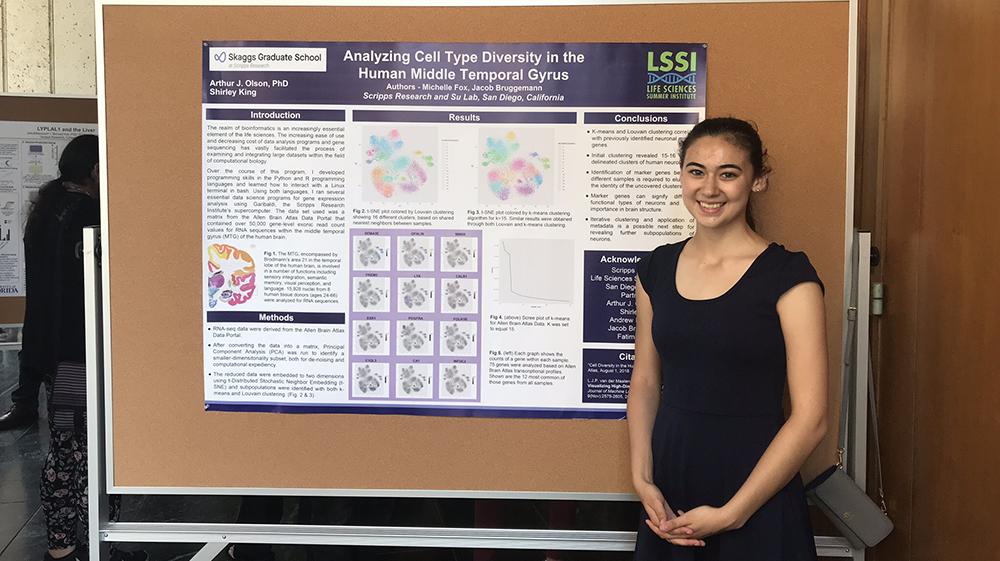
The Life Sciences Summer Institute (LSSI) nourishes a passion for science and math in San Diego’s next generation of scientists through high school internships at leading life sciences companies. LSSI participant Michelle Fox sat down with San Diego Workforce Partnership Business Program Specialist Penelope Oseguera to talk about her internship at the Su Lab. The following has been edited for brevity and clarity.
How did you first hear about the Life Sciences Summer Institute?
I first heard about LSSI at the March of Dimes High School Science Day at the Salk Institute where Dona Mapston, one of the coordinators of the program at Salk, encouraged qualified students to apply. I was inspired by an LSSI graduate who shared his own experience.
What did your research focus on?
I interned at Dr. Andrew Su’s computational biology lab at Scripps, which focuses on making data more accessible through integrative biology to advance biomedical discovery. My project focused on cell type diversity in the human brain and how the presence of certain genes can be implicated in different functional types of neurons. We aren’t usually able to see such information so easily, so my project was centered around being able to graphically represent such data—tying into one of the Su Lab’s goals of making data more accessible to others.
What is one success you are especially proud of during your internship?
Before interning at the Su Lab, I had not known much about computational biology or bioinformatics. During my time in the lab, I learned so many cool things about computer science and how it can be applied to medicine and research! I developed an interest in bioinformatics that could not have formed without an experience as amazing as this one.
Dr. Su had a few interns working for him last summer. How do you feel working directly with other students impacted your work?
I think working with a fellow LSSI student in the lab made it easier for both of us to transition to an internship. Neither my lab partner, Fatima Perez, nor I had interned anywhere before, let alone at a place like Scripps.
Because we had similar backgrounds, we found it easier to connect with one another and with the rest of the lab. If I wasn’t sure about something in our work, Fatima would be able to help and if she wasn’t sure, I could provide some insight. We became more comfortable with the work at hand when we would try and figure it out as a team rather than work individually and it made the internship all the more memorable.
Do you plan to pursue your new interest in bioinformatics as a career?
Right now, I plan on making bioinformatics part of my career, but I’d also like to try out interests I have in related fields while applying the skills I’ve learned along the way. I’m glad that my first internship introduced me to computational biology because the field is incredibly versatile, plus I know I can apply the skills I develop there to several other fields in medicine and research.
Would you recommend the Life Sciences Summer Institute to future participants?
Definitely. The opportunities they provide to high school students like me really are incredible. Without a doubt, being selected for LSSI was one of the greatest things that have happened to me as a high school student and it will only help me achieve even greater things in the future.
What piece of advice would you give to others like you who are interested in life sciences?
Put yourself out there and apply to as many programs as you can that you’re interested in. I was hesitant to apply to LSSI since I knew I was a sophomore in an applicant pool of likely hundreds of competitive upperclassmen. But had I never applied, I wouldn’t have had an opportunity as phenomenal as this one this past summer.
If you’re a life science company interested in an intern, please contact biotech@workforce.org.
